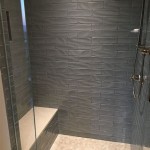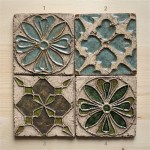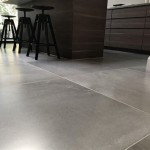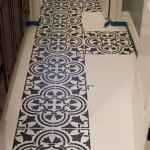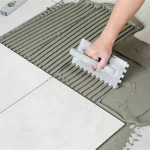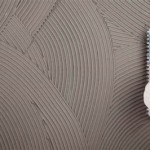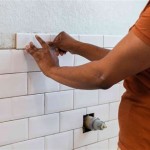All About Quarry Tiles
Quarry tiles are a type of unglazed, extruded tile prized for their durability, slip resistance, and natural appearance. They are a long-lasting flooring and wall covering option suitable for both residential and commercial applications. Their inherent strength and resistance to the elements make them an ideal choice for high-traffic areas and environments where moisture and spills are common.
Unlike ceramic tiles, which are often pressed and glazed, quarry tiles are formed by extruding a mixture of finely ground clay, shale, and water. This extrusion process creates a dense, solid body with consistent color throughout. The tiles are then fired at high temperatures, resulting in a hard, vitrified surface. This process makes them incredibly resistant to wear and tear, cracking, and staining.
The name “quarry tile” can be misleading, as they are not typically made from stone quarried from the earth. The term is a historical reference to the clay quarries where the raw materials were originally sourced. Today, the raw materials are obtained from various sources, but the traditional manufacturing process that gives quarry tiles their unique characteristics remains largely unchanged.
The natural, earthy tones of quarry tiles contribute to their aesthetic appeal. These tiles typically come in shades of red, brown, gray, and occasionally buff, reflecting the natural colors of the clay and shale used in their production. The color variations are subtle, adding depth and character to the surface. This natural color palette allows them to blend seamlessly with a wide range of design styles, from rustic and traditional to modern and industrial.
Durability and Performance Characteristics
The primary advantage of quarry tiles lies in their exceptional durability. The high-temperature firing process creates a tile that is incredibly hard and resistant to abrasion. This makes them an excellent choice for areas that experience heavy foot traffic, such as hallways, kitchens, and entryways. In commercial settings, they are frequently used in restaurants, factories, and other areas where durability is paramount.
Their resistance to moisture and staining is another key benefit. The vitrified surface of quarry tiles is virtually non-porous, preventing water and other liquids from penetrating the tile. This makes them ideal for wet environments such as bathrooms, showers, and patios. While it is still recommended to seal quarry tiles, particularly in areas prone to staining, their inherent resistance to moisture significantly reduces the risk of damage.
Furthermore, quarry tiles are known for their slip resistance. The unglazed surface offers a natural grip, making them a safer choice than many other types of flooring, particularly in areas where spills are common. Some quarry tiles are also manufactured with textured surfaces to further enhance their slip resistance. This makes them a popular choice for commercial kitchens and other areas where safety is a primary concern.
The resistance of quarry tiles to thermal shock is another important consideration. They can withstand significant temperature fluctuations without cracking or warping. This makes them suitable for both indoor and outdoor applications in a variety of climates. They can be used for patios, walkways, and even around swimming pools without fear of damage from freeze-thaw cycles.
Applications of Quarry Tiles
The versatility of quarry tiles allows them to be used in a wide range of applications, both residential and commercial. In residential settings, they are commonly used for flooring in kitchens, bathrooms, and entryways. Their durability and resistance to moisture make them an ideal choice for these high-traffic areas.
They are also frequently used for wall coverings, particularly in kitchens and bathrooms. Their resistance to moisture and staining makes them easy to clean and maintain, while their natural appearance adds warmth and character to the space. They can be used as a backsplash behind countertops or as a full wall covering in showers and bathrooms.
In commercial settings, quarry tiles are frequently used in restaurants, factories, and other areas where durability and slip resistance are critical. Their ability to withstand heavy foot traffic and resist spills makes them an ideal choice for these demanding environments. They are also commonly used in food processing plants and other areas where hygiene is a primary concern.
Outdoor applications of quarry tiles are also common. Their resistance to thermal shock and moisture makes them suitable for patios, walkways, and decks. They can also be used around swimming pools and other outdoor water features. Their natural appearance blends seamlessly with the outdoor environment, creating a cohesive and inviting space.
Beyond floors and walls, quarry tiles can also be used for decorative purposes. They can be cut into various shapes and sizes and used to create mosaics and other decorative patterns. Their natural colors and textures add depth and interest to any design. They can also be used to create custom borders and accents.
Installation and Maintenance
The installation of quarry tiles is similar to the installation of other types of tile. However, due to their density and weight, it is important to use a high-quality mortar and ensure that the subfloor is properly prepared. A stable and level subfloor is essential to prevent cracking and ensure a long-lasting installation.
Before installation, it is generally recommended to seal the quarry tiles. This will help to protect them from staining and make them easier to clean. A penetrating sealer is typically used, which will soak into the tile and create a barrier against moisture and stains. The sealer should be applied according to the manufacturer's instructions.
During installation, it is important to use proper spacing between the tiles. This will allow for expansion and contraction due to temperature changes and prevent cracking. The spacing should be consistent and uniform throughout the installation. Grout is then applied to fill the spaces between the tiles. The grout should be carefully selected to complement the color of the tiles and the overall design of the space.
Once the grout has dried, it is important to seal it to prevent staining and mildew growth. A grout sealer should be applied according to the manufacturer's instructions. Regular cleaning is essential to maintain the appearance of quarry tiles. They can be cleaned with a mild detergent and water. Avoid using harsh chemicals or abrasive cleaners, as these can damage the surface of the tile.
Periodically, it may be necessary to deep clean quarry tiles to remove stubborn stains or buildup. This can be done with a specialized tile cleaner or a mixture of baking soda and water. It is important to follow the manufacturer's instructions carefully and test the cleaner in an inconspicuous area before applying it to the entire surface.
With proper installation and maintenance, quarry tiles can last for many years, providing a durable, attractive, and low-maintenance flooring or wall covering option. The natural appearance and inherent strength of these tiles make them a valuable addition to any home or commercial space.

Quarry Tile Designing Buildings

Gray Quarry Tile Style Along With Superior Functionality

Quarry Tiles What Do You Think Houzz

Quarry Tiles Cube Tiling Llp

Quarry Tile Cleaning Services Stone Medic

What Is Quarry Tile Flooring Metropolitan Ceramics

Constrology Tile Quarry

What Is Quarry Tile

Quarry Tile

How To Clean Quarry Tiles Cleaning Guide Tips Re Tile Floors
Related Posts

